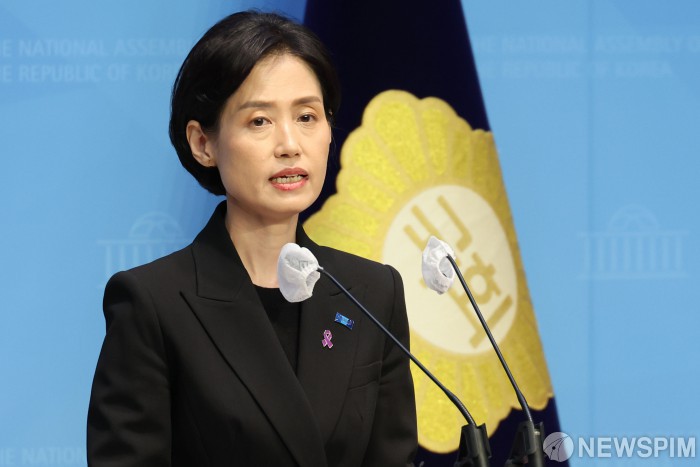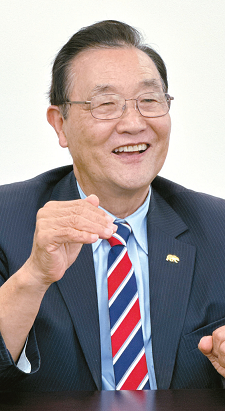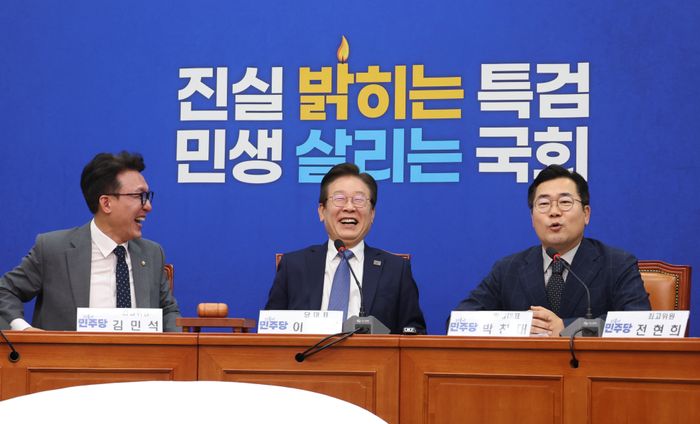경실련은 2024년 9월 26일(목), 경실련 강당에서 <윤정부 대통령실 고위공직자 부동산 보유 및 종부세 대상자 실태발표> 기자회견을 가졌다.

윤석열 정부는 집권 이후 종합부동산세(종부세) 완화 및 폐지를 시도하고 있다. 2022년에는 공정시장가액비율을 95%에서 60%로 낮췄고, 2023년에는 종부세 기본공제액을 6억 원에서 9억 원(실거주 1주택자의 경우 11억 원에서 12억 원)으로 상향 조정한 바 있다. 이도 모자라 2024년 6월 17일에는 종부세 폐지 방안을 발표했다.
이러한 정부 기조에 발맞춰 국민의힘의 추경호 원내대표는 지난 9월 5일에 열린 제22대 국회 첫 정기국회 교섭단체 대표 연설에서 종부세 완화 방침을 다시금 밝혔다. 이후 국민의힘 송언석 기획재정위원장은 지난 9월 12일 1가구 1주택자의 종부세 공제액을 기존 12억 원에서 15억 원으로 상향하고, 3주택 이상을 소유한 다주택자 중과세율을 폐지하는 내용이 포함된 종부세 개정안을 발의했다.
정치권은 이러한 종부세 완화 정책을 ‘중산층 복원’이라고 포장하고 있지만, 사실은 정치권력과 경제 권력을 독점하고 있는 소수 1%를 위한 정책임이 분명하다.
이에 경실련은 종부세 감면의 혜택이 일반 중산층이 아닌 정치권을 포함한 특정 소수 계층에 집중되고 있다는 사실을 알리기 위해 고위공직자를 대상으로 부동산 보유 실태 및 종부세 대상자를 조사 발표하고 있다.
2024년 8월 29일에 발표된 ‘윤석열 정부 장․차관 종부세 조사대상자 조사발표’에 이어, 이번에는 윤석열 정부 대통령실 고위공직자를 대상으로 조사해 발표했다.
경실련은 (종부세 폐지는) 이를 통해 보유한 부동산 자산에 대비하여 종부세 대상자 및 납부액이 계속해서 줄어들고 있는 종부세 완화의 혜택을 정책을 추진하는 대통령실 고위공직자가 받고 있다“고 지적했다.
이번 조사는 2024년 1월 이후 재산을 공개한 윤석열 정부 대통령실 고위공직자 70명 중 2024년 9월 1일 기준 현직에 있는 48명을 대상으로 진행했다. 조사는 대상자들의 재산 중 본인․배우자 명의로 보유하고 있는 주택을 중심으로 하였으며, 종부세 예상 세액은 국세청 홈택스의 ‘종합부동산세 간이세액계산’ 도구를 이용해 추정했다.

본인․배우자 명의 부동산재산 인당 평균 16.5억 원, 김태효 84.6억 원 최고
조사 결과, 조사대상 중 본인 ․ 배우자 명의로 부동산 보유를 신고(전세 등을 제외)한 42명의 신고가액(공시가 기준)은 총 725억 9,885만 원(평균 16억 4,997만 원)이다. 상위 10명의 본인 ․ 배우자 명의 부동산 신고가액은 총 372억 1,148만 원(인당 평균 37억 2,115만 원)이고, 상위 3명에는 김태효 국가안보실 제1차장 84억 5,886만 원, 정진석 대통령비서실장 49억 3,619만 원, 최지현 대통령비서실 인사비서관 41억 7,000만 원 등이 포함되었다. 이 중 주택 재산은 정진석 대통령비서실장 40억 5,800만 원으로 많았고, 토지 재산은 최종균 대통령비서실 저출생대응비서관 15억 3,119만 원으로 가장 많았다.
종부세 대상 16명의 인당 주택 신고가액 19.2억 원, 종부세는 약 133만 원
현재 종부세 기본공제액 9억 원, 1세대 1주택자 12억 원 기준에 따르면, 조사 대상 48명 중 16명(33.3%)이 종부세 대상자로 추정된다. 이들 16명의 종부세 대상 주택 신고가액은 총 307억 9,840만 원(인당 평균 19억 2,490만 원)이며, 이에 따른 종부세 예상액은 총 2,132만 원(인당 평균 133만 원)이다. 임대업자 공제 및 1세대 1주택자 세액공제가 적용되지 않았음을 감안 하면, 실제 예상 세액은 이보다 더 적을 것으로 추정된다.
본인 ․ 배우자 명의 부동산 신고가액 1위로 나타났던 김태효 국가안보실 제1차장의 경우 부동산재산으로 84억 6천만 원을 신고했지만, 종부세는 상가 재산(53억 9천만 원) 등을 제외한 주택 재산(17억 원)에 한해 부과될 것으로 예상된다. 이는 주택과 상가업무 빌딩의 종부세 부과기준이 크게 차이나기 때문이다.
이미 한 차례 종부세 완화로 종부세 대상자 20명에서 16명으로 감소
이렇듯 윤석열 정부 장․차관 38명 중 18명(47.4%), 대통령실 48명 중 16명(33.3%)이 종부세 대상자인 결과는 우리 국민 가구 중 종부세 납부 가구가 1.8%에 불과한 것과 대조했을 때, 월등히 높은 수치다.
게다가 윤석열 정부는 이미 2023년에 종부세 기본 공제액을 기존 6억 원(1세대 1주택 11억 원)에서 9억 원(1세대 1주택 12억 원)으로 상향 조정한 바 있다. ‘21년 종부세 기준에 따를 경우 종부세 대상자는 20명으로 늘어나, 결국 종부세 완화의 혜택을 정책을 추진하는 대통령실 고위공직자가 받고 있다.
종부세는 2006년 도입 이후 대상자인 정책 입안자 및 정책 추진자들에 의해 형해화 되어 왔다. 단독명의자의 경우 기본공제액의 2배에 가까운 공제를 받을 수 있으며, 1세대 1주택자의 경우 장기 보유, 고령자에 대한 각종 공제 혜택이 주어지고 있다.

대통령비서실의 경우를 종부세 대상 1세대 1주택자 9명의 경우, 세액공제 혜택이 없다면 총 2,861만 원(인당 평균 318만 원)을 납부해야 하지만, 세액공제 혜택 시 총 572만 원(인당 평균 63만 원)만 납부하면 되어 세액공제 혜택을 최대 2,289만 원(인당 254만 원)까지 받을 수 있는 것으로 추정된다. 이 중 공동명의자 4명의 경우 공동명의 기본공제액(인별 9억, 총 18억) 적용 시 종부세 예상액 총 1,165만 원(인당 291만 원)으로 나타나, 단독명의 기본공제액(1세대 1주택 12억) 적용 시 종부세 예상액 총 2,589만 원(인당 647만 원) 대비, 1,424만 원(인당 356만 원) 가량 절세 가능한 것으로 나타난다.
이렇듯 종부세 완화 정책은 정치권력자들의 이해관계와 맞물려 있다. 이러한 상태에서 윤석열 정부가 계속해서 종부세 완화 정책을 시도한다면, 이는 명백한 이해충돌이자, 상위 1%만을 대변하는 것이다.
완화시킨 종부세 기본공제액 원상 복구하고, 공정시장가액비율 폐지해야
끝으로 경실련은 ”우리 국민 중 종부세 대상자는 상위 1% 미만으로, 종부세 완화 정책은 중산층을 위한 정책이 아님을 분명하다. 종부세의 근본 취지는 부동산 불로소득에 대한 과세와 지방재정의 확보에 있다는 점에서 윤석열 정부가 종부세 완화 시도를 즉각 중단하고 정치권이 형해화된 종부세를 강화하는 쪽으로 정상화하는 데에 힘을 모을 것“을 강력 촉구했다.
경실련은 ”정부가 추진하고 있는 종부세 완화 정책이 정치권력과 경제권력을 독점한 상위 1%를 위한 정책이다“며, ”종부세 기본공제액을 6억 원(1세대 1주택 9억 원)으로 원상 복구하라!“고 촉구했다.
이들은 ”과세표준을 낮추는 공정시장가액비율 제도를 폐지하고, 다주택자 임대업 감면 혜택, 1세대 1주택자 세액공제 혜택 폐지하라!“며, ”공시가격·공시지가 시세반영률을 80% 이상으로 제고하라!“고 강력 촉구했다. hpf21@naver.com
* 아래는 위 기사를 '구글 번역'으로 번역한 영문 기사의 [전문]입니다. '구글번역'은 이해도 높이기를 위해 노력하고 있습니다. 영문 번역에 오류가 있을 수 있음을 전제로 합니다.
*The following is [the full text] of the English article translated by 'Google Translate'. 'Google Translate' is working hard to improve understanding. It is assumed that there may be errors in the English translation.
The Yoon administration's presidential office, 16 out of 48 high-ranking public officials subject to the comprehensive real estate tax, are they qualified to discuss the comprehensive real estate tax?
Among households paying the comprehensive real estate tax, 1.8%... Comprehensive real estate tax relief is not a policy for the middle class
On Thursday, September 26, 2024, the Korea Center for Real Estate Studies held a press conference titled
Since taking office, the Yoon Seok-yeol administration has attempted to ease and abolish the comprehensive real estate tax (comprehensive real estate tax). In 2022, the fair market value ratio was lowered from 95% to 60%, and in 2023, the basic deduction for the comprehensive real estate tax was increased from KRW 600 million to KRW 900 million (KRW 1.1 billion to KRW 1.2 billion for those who actually live in one house). In addition, on June 17, 2024, he announced a plan to abolish the comprehensive real estate tax.
In line with this government policy, People Power Party floor leader Choo Kyung-ho once again announced a plan to ease the comprehensive real estate tax in his speech as the representative of the negotiating group at the first regular session of the 22nd National Assembly held on September 5. After that, People Power Party Planning and Finance Committee Chairman Song Eon-seok proposed a comprehensive real estate tax revision bill on September 12 that includes raising the comprehensive real estate tax deduction amount for one home per household from the existing 1.2 billion won to 1.5 billion won and abolishing the high tax rate for multiple homeowners who own three or more homes.
The political world is packaging this comprehensive real estate tax relaxation policy as ‘restoring the middle class,’ but it is clear that it is in fact a policy for the small 1% who monopolize political and economic power.
Accordingly, the Korea Center for Real Estate Studies is conducting a survey and announcing the results of a survey on the real estate holdings and the subjects of the comprehensive real estate tax targeting high-ranking public officials in order to inform the public that the benefits of the comprehensive real estate tax reduction are concentrated on a specific minority including the political circle, not the general middle class.
Following the announcement of the ‘Survey of Subjects of the Comprehensive Real Estate Tax Survey for Ministers and Vice Ministers of the Yoon Seok-yeol Government’ on August 29, 2024, this time, a survey was conducted and announced targeting high-ranking public officials in the Presidential Office of the Yoon Seok-yeol government.
The Korea Center for Real Estate Studies pointed out that “the benefits of the comprehensive real estate tax abolition, which continuously reduces the subjects and amount of comprehensive real estate tax compared to the real estate assets held, are being received by high-ranking public officials in the Presidential Office who are promoting the policy.”
This survey was conducted on 48 of the 70 high-ranking public officials in the Presidential Office of the Yoon Seok-yeol government who disclosed their assets after January 2024 and are currently in office as of September 1, 2024. The survey focused on the housing owned by the subjects in their own or spouse’s name among their assets, and the expected comprehensive real estate tax amount was estimated using the ‘Comprehensive Real Estate Tax Simplified Tax Calculation’ tool on the National Tax Service’s Hometax.
The average real estate property owned by the subjects and spouse was 1.65 billion won per person, with Kim Tae-hyo having the highest at 8.46 billion won
As a result of the survey, the total reported value (based on the public notice value) of the 42 subjects who reported owning real estate in their own or spouse’s name (excluding jeonse, etc.) was 72.59885 billion won (average of 1.64997 billion won). The top 10 subjects and The total reported value of real estate under the spouses' names is 37.21148 billion won (average of 3.72115 billion won per person), and the top three include Kim Tae-hyo, 1st Vice Director of the National Security Office, with 8.45886 billion won, Jeong Jin-seok, Chief of Staff to the President, with 4.93619 billion won, and Choi Ji-hyun, Secretary to the President for Personnel, with 4.170 billion won. Of these, Jeong Jin-seok, Chief of Staff to the President, had the largest housing assets at 4.058 billion won, while Choi Jong-gyun, Secretary to the President for Low Birth Rate Response, had the largest land assets at 1.53119 billion won. =
16 people subject to comprehensive real estate tax, housing declaration value per person 1.92 billion won, comprehensive real estate tax approximately 1.33 million won
According to the current comprehensive real estate tax basic deduction amount of 900 million won and the standard of 1.2 billion won for a single-home owner per household, 16 out of the 48 people surveyed (33.3%) are estimated to be subject to comprehensive real estate tax. The total reported housing value of these 16 people subject to comprehensive real estate tax is 30.7984 billion won (average of 1.9249 billion won per person), and the estimated comprehensive real estate tax amount is 21.32 million won (average of 1.33 million won per person). Considering that the landlord deduction and single-home owner tax deduction were not applied, the actual estimated tax amount is estimated to be less than this.
Self ․ In the case of Kim Tae-hyo, the 1st Vice Director of the National Security Office, who was ranked first in the amount of real estate reported under his spouse's name, he reported real estate assets worth 8.46 billion won, but it is expected that the comprehensive real estate tax will be levied only on his housing assets (1.7 billion won), excluding commercial properties (5.39 billion won). This is because the comprehensive real estate tax imposition standards for housing and commercial buildings differ significantly.
=
The number of people subject to the comprehensive real estate tax has already decreased from 20 to 16 due to the comprehensive real estate tax relaxation.
The fact that 18 out of 38 ministers and vice ministers in the Yoon Seok-yeol government (47.4%) and 16 out of 48 members of the presidential office (33.3%) are subject to the comprehensive real estate tax is a significantly higher figure when compared to the fact that only 1.8% of households in our country pay the comprehensive real estate tax.
In addition, the Yoon Seok-yeol government has already increased the basic deduction amount for the comprehensive real estate tax from the existing 600 million won (1.1 billion won per household, 1 house) to 900 million won (1.2 billion won per household, 1 house) in 2023. According to the 2021 comprehensive real estate tax standards, the number of people subject to the comprehensive real estate tax has increased to 20, and the benefits of the comprehensive real estate tax relief are ultimately being received by high-ranking officials in the presidential office who are promoting the policy.
Since its introduction in 2006, the comprehensive real estate tax has been formalized by policymakers and policy promoters who are the subjects. In the case of a sole owner, a deduction amount close to twice the basic deduction amount can be received, and in the case of a single-household owner, various deduction benefits are provided for long-term holding and the elderly.
In the case of the Office of the President, in the case of 9 people with 1 house per household subject to the comprehensive real estate tax, if there is no tax deduction benefit, they would have to pay a total of 28.61 million won (average of 3.18 million won per person), but with the tax deduction benefit, they only have to pay a total of 5.72 million won (average of 630,000 won per person), so it is estimated that they can receive a tax deduction benefit of up to 22.89 million won (2.54 million won per person). In the case of 4 joint owners, when the basic deduction amount for joint owners (900 million won per person, 1.8 billion won in total) is applied, the total expected comprehensive real estate tax is 11.65 million won (2.91 million won per person), which means that when the basic deduction amount for a single owner (1.2 billion won for 1 house per household) is applied, the total expected comprehensive real estate tax is 25.89 million won (6.47 million won per person), which means that they can save about 14.24 million won (3.56 million won per person). As such, the comprehensive real estate tax relief policy is intertwined with the interests of those in power. If the Yoon Seok-yeol government continues to attempt to ease the comprehensive real estate tax in this situation, it is a clear conflict of interest and only represents the top 1%.
The basic deduction for the relaxed comprehensive real estate tax should be restored and the fair market value ratio should be abolished.
Lastly, the Korea Center for International Finance repeatedly urged, “The comprehensive real estate tax is less than the top 1% of our citizens, and it is clear that the comprehensive real estate tax relief policy is not a policy for the middle class. The fundamental purpose of the comprehensive real estate tax is to tax unearned income from real estate and secure local finances, so the Yoon Seok-yeol government should immediately stop its attempts to ease the comprehensive real estate tax and join forces to normalize the political world’s strengthening of the formalized comprehensive real estate tax.”
The Korea Center for Real Estate Studies said, “The comprehensive real estate tax relief policy being promoted by the government is a policy for the top 1% who monopolize political and economic power,” and urged, “Restore the basic comprehensive real estate tax deduction to 600 million won (900 million won per household, 1 house)!”
They strongly urged, “Abolish the fair market value ratio system that lowers the tax base, and abolish the rental business reduction benefit for multiple-homeowners and the tax deduction benefit for single-homeowners per household!” and “Raise the market price and market price reflection rate to 80% or more!” hpf21@naver.com

![국민 49.5% "임종석 '통일하지 말자' 발언, 부적절" [데일리안 여론조사]](https://cdnimage.dailian.co.kr/news/202409/news_1727271004_1410589_m_1.jpeg)
![[단독] 용산 '7개월째 공석' 여가부 장관 인선 착수…전주혜 거론](https://pds.joongang.co.kr/news/component/htmlphoto_mmdata/202409/27/af8cfef9-522e-4bf4-b0e7-501f2467554d.jpg)




![尹대통령 부정평가 69%…역대 최고치 기록 [NBS]](https://pds.joongang.co.kr/news/component/htmlphoto_mmdata/202409/26/66725f00-2c4c-478e-8df0-c3f173cdeed9.jpg)